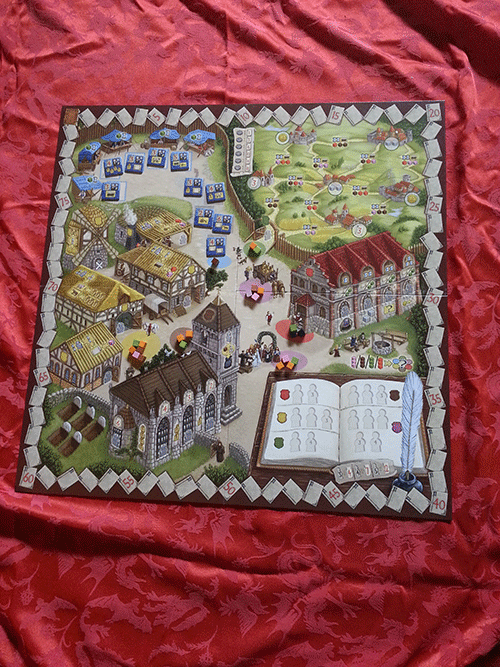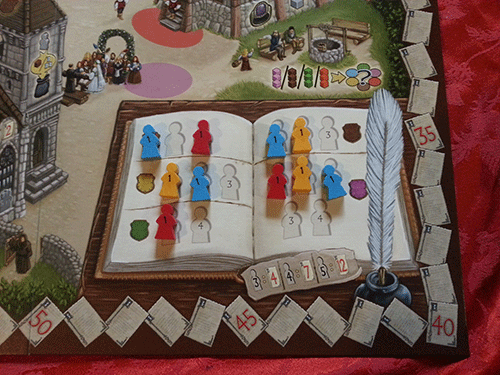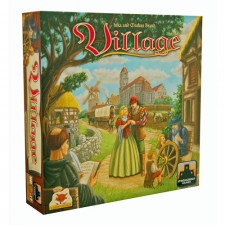Village Review
on May 17, 2016
It’s a quiet life, a simple life. But one nevertheless replete with challenges. In Village, each player heads a family helping to found the titular village. Over time, older members of the family pass away and are replaced by younger generations. But the old timers are not forgotten. Instead their names are placed in the Book of Remembrance and regarded as town fathers. At least, if there is still room for them. Otherwise, it’s straight to the anonymous graves.
Players begin with four members of the first generation hanging out on their personal farm. The main village board is then seeded with various cubes depending on the number of players. There is a market space, a place for crafted goods, weddings and farming, travel, politics, and even clergy.

On their turn, a player will take a cube from one of the action spaces and then may complete that action. Often, that means training one of their family members to work in that area. So you might have priests and plow-makers among your relatives. Of course, training takes time which is marked off on their player board. Importantly, the cubes you take are also a currency in the game. So sometimes you can avoid the loss of time by spending cubes for certain actions.
And why would you want to avoid spending time? When your time marker circles around your board, a member of your family’s oldest generation is put to rest. The game has a Book of Remembrance and your deceased relative can be lovingly placed there. But it only has a set number of spaces for each occupation. After a few farmers have already been remembered, the town stops considering new dead farmers to be book-worthy. When the book fills up, the game is over. And if there isn’t room in the book, the deceased heads to the anonymous graves to be forgotten. If those graves fill up, the game also ends.
Village puts players at the center of a wide array of strategies and just says, “Go.†A favorite of mine is to send travelers far and wide to visit other towns. Each visited spot is worth bonus points at game end, but requires a significant investment in cubes and craft goods. Meanwhile, getting into the city council is not without its advantages. At the highest levels, players can convert coins directly into points – as politicians are wont to do.
And no one can afford to miss out on the market. Each round, several customers will come asking for goods. If you can satisfy their demands – usually for various combinations of craft goods – they award you points. Markets are a consistent point generator and a player that ignores them will be greatly handicapped.
While the theme is peaceful, and the game lacks much of a “take that†element, there is some stiff competition taking place. Looking from player to player, you can see who is trying to accomplish what. Sometimes, it’s worth it to take a cube from somewhere just to deprive another player of that action. And, of course, the same will happen to you. So you need to be able to pivot as necessary to gain points in other ways. Plus, players should always keep their eye on the marriage action. Without a new generation, there will be no one to replace the elderly.

And the way actions are taken is really unusual. You can only take an action as long as there are cubes, and you get to keep the cube you choose. Sometimes, you’ll want a green cube, but the only place it’s present is on a less optimal action. Do you go for the action you want or the cube you need?
Village is among those rare games that provide healthy competition with a relatively serene theme. Even other games focusing on pastoral endeavors tend to put players under tight pressure. Village eschews mechanism enforced pressures in favor of ones generated by players.
For instance, players have complete control over game end. Maybe you want to conserve your time and have your family generating abilities for as long as possible. Or, maybe it makes sense to rush the game end by purposely filling up the Book of Remembrance or anonymous graves before opponents can get their synergies developed. When do you get in on politics and when do you avoid the clergy? These decisions are highly influenced by your opponents.
Village is an interesting and challenging title that succeeds well with casual and hobby gamers. Players are faced with many interesting decisions and allowed a number of clever stratagems that make the game worth returning to repeatedly. It provides a satisfying experience within a low-key/high-fun framework.

 Customer Support
Customer Support  Subscribe
Subscribe 




 Account
Account  Wishlist
Wishlist 

